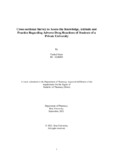Cross-sectional survey to assess the knowledge, attitude and practice regarding adverse drug reactions of students of a private university
Abstract
Purpose: An adverse drug reaction (ADR) is an unfavorable occurrence that occurs after taking a drug or a combination of drugs. The objective of this study was to evaluate the knowledge, attitude, and practices regarding ADR reporting among the general population of Dhaka, Barisal, Sylhet, Chittagong and Pabna,
Method: A cross-sectional study was conducted by distributing a pretested questionnaire. The randomly selected participants of Dhaka, Khulna, Sylhet, Chittagong, and Barisal took part in the study. The data were analyzed by using Statistical Package for Social Science (SPSS) version 26.0 for calculating descriptive statistics.
Result: Among the participants (n= 104), 80 respondents (76.92%) knew about adverse drug reactions. Among them, 67 (64.42%) were from urban areas. The mean age of participants was 25.798. 36.54% of respondents came across pharmacovigilance awareness programs. 73 (70.19%) understood the difference between side effects and ADRs. Reporting ADRs to doctors was the topmost choice of the respondents, 51 (49.04%) asked about adverse drug reactions to their physicians during prescribing. Though reporting ADRs to doctors was the topmost choice for respondents (66.7%), majority of the (33%) respondents thought pharmacists were the most important stakeholder in ADRs management.
Conclusion: From the study we concluded that ADRs reporting is not taken seriously in Bangladesh and reporting practice should be developed soon. The results we got from our survey shows that Bangladeshi people have less knowledge about the topic of pharmacovigilance and spontaneous ADRs reporting system.

